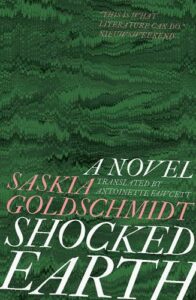The global outbreak of COVID-19 has affected every part of human lives, including the physical world. As we now navigate a post-pandemic era, it’s become even clearer that how we treat the natural world around us is paramount to its – and our own – survival.
Shocked Earth, by Dutch writer Saskia Goldschmidt, was written in 2018, way before phrases like ‘social distancing’ and ‘flatten the curve’ were a part of our daily lexicon. But now, with the publication of the English translation by Antoinette Fawcett, its subject matter is all the more urgent.
 The novel follows the lives of the Koridon family: Femke, her mother Trijn and her grandfather, Zwier, who each have different ideas about how to run their family farm in Groningen province. Femke wants to switch to sustainable growing principles, but Trijn is “convinced that you need to scale up to compete in the world market”. Zwier is reluctant to abandon the traditional methods he has always known. With three generations all living under the same roof and working together, you might expect things to be a little fraught. But the Koridon family is rife with decades-old tension. And if all that familial drama isn’t enough, their home province is experiencing a series of earthquakes caused by a gas extraction operation near their farm.
The novel follows the lives of the Koridon family: Femke, her mother Trijn and her grandfather, Zwier, who each have different ideas about how to run their family farm in Groningen province. Femke wants to switch to sustainable growing principles, but Trijn is “convinced that you need to scale up to compete in the world market”. Zwier is reluctant to abandon the traditional methods he has always known. With three generations all living under the same roof and working together, you might expect things to be a little fraught. But the Koridon family is rife with decades-old tension. And if all that familial drama isn’t enough, their home province is experiencing a series of earthquakes caused by a gas extraction operation near their farm.
In reality, these extractions, which began in the 1950s, have caused significant damage to this region of the Netherlands. Schokland, the Koridons’ farm, represents the local farmers affected by the drilling. When she was writing the book, Goldschmidt rented a cottage in the heart of the area hit by the induced earthquakes and “became deeply involved in the life of the community”. The Government, spurred on by the economic benefits of gas discovered beneath the clay lands, failed to acknowledge the financial stress and insecurity experienced by the residents. While the earthquakes don’t appear as severe on the Richter scale (a measure of the strength of earthquakes), they have caused insurmountable damage and distress, not to mention instability to the surrounding area.
The Koridons have lived with the damage for four years (“more and more cracks are appearing in the byre walls, caused by ever more frequent tremors”) but are mired in bureaucracy, which prevents them from seeking accurate recompense. Excuses are made by administrators, riggers deny responsibility, and company receptionists hold the fort against complaints. There’s an ever-present threat of the next earthquake, this one bigger than the last, and the Koridons are trying desperately to hold onto their past, present and future.
The book is well written, and Goldschmidt is adept at describing the backdrop of the Groningen province. The story is rooted in the landscape, which is almost idyllic, filled with the “heavy scent of May blossom and cow parsley” as well as “magenta-coloured flowers and purple foxtails”, and the birdlife and fauna are described in exquisite detail. But something insidious is lurking in the background, increasing in momentum (“the roaring din and chilly dampness, which in spite of the double-glazed windows and the insulation in the rooms always finds crannies to get through, is making people shiver”) and, despite its picturesque exterior, the land is disintegrating (“cracks appeared everywhere, as if their farm was an old painting that was crumbling into crackleware”).
Shocked Earth is also an impressive work of translation. While there are a few odd expressions and clumsy sentences, none of these distract the reader from the story. Living in Cumbria, Fawcett, an award-winning member of the Translators Association of the Society of Authors, chose to use words distinctive to the North of England (such as byre and stead) and, in the Translator’s Note, states that she “aimed to layer the familiar with the unfamiliar”. This not only works well as a device to translate the original text into English, but also as a way to show how we’re all inextricably linked, regardless of our mother tongue. These issues, ecological or otherwise, are important on a global scale – and a result of a dangerous collective apathy.
Fawcett says: “After all, here and elsewhere are deeply interconnected: the fate of one particular family in a remote corner of the Netherlands is absolutely linked into the fate of humanity as a whole.” Similarly, the novel’s epilogue ends with the line: “That people refuse to learn from history may be humanity’s greatest tragedy”, and it’s impossible not to heed that as a warning. If the last 18 months have taught us anything, it’s that we’re all responsible for the fate of our planet, which is struggling to remain resilient in the face of so-called progress.
Shocked Earth is a powerful testament to what happens when the gatekeepers of the land, those with a deep connection to the earth, are silenced and displaced. But it’s also full of hope. And we could all do with a good dose of that.
By Emma Yates-Badley, Literary Editor
This review was first published on the website of Northensoul.me.uk







[…] By Emma Yates-Badley […]